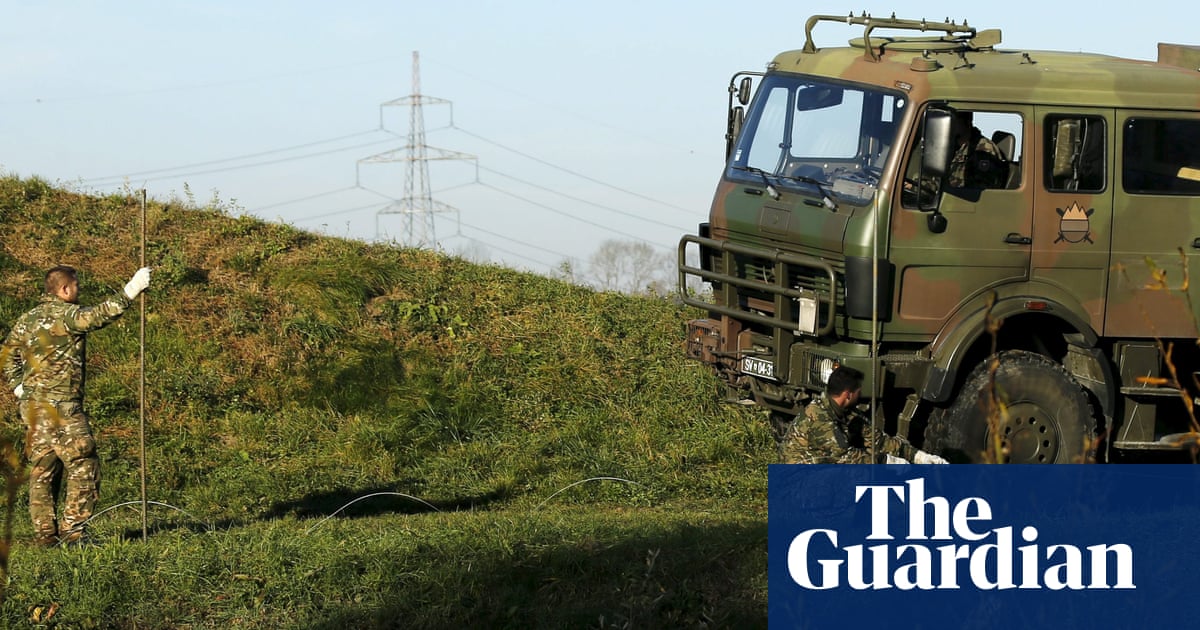Just two of 30 European countries have set a date to stop their militaries from emitting planet-heating emissions, a Guardian analysis has found, raising concerns about the carbon cost of Europe’s coming rearmament wave.
Austria and Slovenia are the only countries whose defence ministries have committed to reaching net zero military emissions, according to an analysis of 30 European countries, with only about one-third having worked out the size of their carbon footprint.
The findings confirm a “longstanding blind spot” in assessments of global emissions, said Florian Krampe, who leads climate research at the Stockholm International Peace Research Institute (Sipri).
“Ignoring military emissions is not just concerning with regard to climate change,” he said. “It ignores the growing recognition of climate change being a serious security risk for Europe and beyond.”
Researchers estimate the world’s militaries account for 5.5% of global emissions – more than flying but less than steel making – but international climate treaties do not require governments to report their emissions. Campaigners have argued this “military exceptionalism” will harm long-term security by further heating the planet and increasing conflicts over resources such as water and food.
The analysis of military climate plans from the 27 EU member states and the UK, Norway and Switzerland – all of whom have committed to reaching net zero emissions by 2050 – found nearly all their defence ministries lacked short-term targets to sharply cut emissions and long-term goals to bring their net climate impact to zero.
The defence ministries of countries such as Germany, the Netherlands, Greece and the UK said they were “contributing” to their national net zero goals but had not set their own targets to do so.
“Our overriding goal is and remains the preservation of peace,” said a spokesperson for the German Ministry of Defence. “Climate protection must not come at the expense of the performance of our weapon systems.”
The British Royal Air Force has set itself an ambitious net zero target of 2040 – a decade earlier than the country’s national climate pledge – but other parts of the armed forces have not. A UK government spokesperson said the defence ministry would contribute to the country’s national climate goal “while maintaining or enhancing operational advantage”.
Some countries’ armed forces have set net zero targets that cover only part of their output. Belgium’s defence ministry is targeting climate-neutral infrastructure by 2040, while Portugal’s aims to become carbon neutral in “mission support activities” by 2050.
“Fully replacing all weapon systems or offsetting their emissions is economically unfeasible, which is why efforts are focused on support areas where this objective is attainable,” a spokesperson for the Portuguese defence ministry said.
Other countries have set 2030 targets but not set a date to reach net zero. Norway plans to cut emissions by 20% from 2019 levels by the end of the decade, while Ireland is aiming for a 51% cut from 2016-18 levels.
Campaigners say the efforts being made to cut military carbon emissions greatly lag behind other sectors of the economy and are likely to be insufficient to compensate for a rise in spending on fuel, infrastructure and equipment.
Ellie Kinney, a military emissions campaigner at the Conflict and Environment Observatory, said there had been “considerable momentum” behind decarbonising militaries over the last two years that was now being threatened by Europe’s rush to rearm.
“Military decarbonisation is essential for our future security,” she said. “We call on governments to set clear emissions reduction targets and publish thorough and transparent reporting of military greenhouse gas emissions.”
While the military’s carbon intensity is likely to fall as the global economy grows cleaner, experts say the heavy fossil fuel consumption of vehicles such as planes, ships and tanks will require serious effort to clean up. Military sources say many actions that are being taken today – such as investing in solar panels, heat pumps and fuel-efficient vehicles – are driven by a desire to save money, though factors such as cutting pollution, reducing emissions and increasing energy independence also play a role.
A spokesperson for the Austrian defence ministry, which is targeting climate neutrality in 2040, said it had made the most progress in decarbonising buildings through actions such as buying green electricity and expanding district heating. “However, reducing emissions in military mobility remains a major challenge, at least until civilian technological advancements become applicable to military operations,” they said.
The defence ministries of Bulgaria, Hungary and Slovakia did not respond to requests for comment. Italy, Spain and the Czech Republic declined to comment.
Total military spending in Europe rose by 17% to $693bn in 2024, according to data from Sipri, as part of a rearmament wave that comes after years of European Nato members failing to meet a spending commitment of 2% of their GDP. The political shift, which was triggered by Russia’s full-scale invasion of Ukraine, has taken on new urgency in recent months after Donald Trump has cast doubt on US support for the defence of Ukraine.
The challenge is ensuring that these defence investments do not further weaken climate commitments, said Krampe.
“The defence sector can no longer be a blind spot in climate action,” he said. “Rising military spending should drive green innovation, not lock in carbon dependence.”
